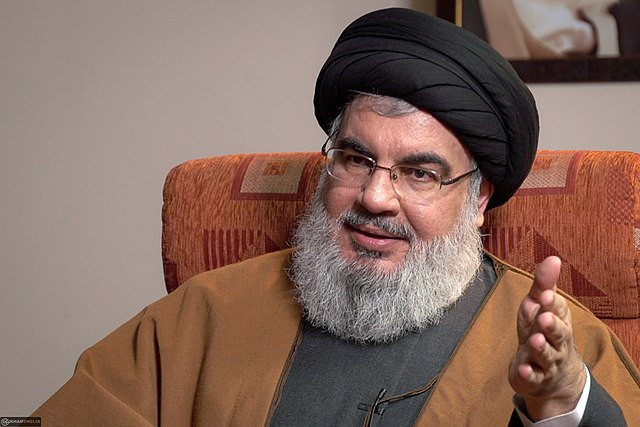In a televised address on Thursday, Hezbollah leader Hassan Nasrallah condemned Israel's recent remote detonations of communication devices in Lebanon, describing the act as a "declaration of war." The explosions, which targeted pagers and walkie-talkies used by Hezbollah members, resulted in significant casualties and heightened the risk of a broader conflict between the two adversaries.
Nasrallah's speech marked his first public reaction to the attacks, which killed at least 32 people and left over 3,300 injured, many of whom were members of Hezbollah's military units. He warned that Israel would face "just punishment" for its actions, though he refrained from offering specific details on the group's intended retaliation. However, his remarks underscored a growing risk of escalation along the Israeli-Lebanese border, with the prospect of full-scale war becoming increasingly likely.
Earlier on Thursday, Hezbollah launched a series of attacks against Israeli forces near the border, which left two Israeli soldiers dead and several others seriously wounded. Israel responded with airstrikes in southern Lebanon, targeting what it described as Hezbollah strongholds. "Hezbollah turned southern Lebanon into a fighting area and hid weapons in civilian homes and dug tunnels under them," the Israel Defense Forces (IDF) stated.
As Nasrallah delivered his speech, Israeli fighter jets were seen flying over Beirut, generating sonic booms in a show of force. The Hezbollah leader acknowledged that the attacks on communication devices represented "an unprecedented and historic blow" to the group, claiming that Israel intended to kill 5,000 Hezbollah operatives within minutes. He accused Israel of crossing "all rules and red lines" in its actions.
According to Nasrallah, Israel had sent messages through mediators after the initial wave of attacks, demanding an end to Hezbollah's support for Hamas in Gaza and warning of further strikes if fighting on the Lebanese front continued. "We tell Netanyahu, Gallant, and the Israeli military: the fighting on the Lebanese front will not stop before the war in Gaza ends," Nasrallah stated. He further warned that Israel's northern residents would only be able to return to their homes once the war concluded, suggesting that continued conflict with Hezbollah would lead to more displaced civilians in Israel.
The Iranian state news agency IRNA reported that Maj. Gen. Hossein Salami, commander of the Islamic Revolutionary Guard Corps (IRGC), had sent a letter to Nasrallah, pledging a "crushing response from the resistance front soon." Meanwhile, Israeli Defense Minister Yoav Gallant indicated that the situation presented both significant opportunities and serious risks for Israel. "Hezbollah feels it is being hunted, and the sequence of our military operations will continue. Our goal is to return the residents of the north to their homes safely," Gallant said in a meeting with senior commanders.
As tensions rose along the Israel-Lebanon border, a global investigation into the origin of the pager attacks widened, focusing on countries like Bulgaria and Norway. On Thursday, Bulgarian authorities revealed that they had opened an investigation into a possible connection between a local company, Norta Global Ltd, and the supply of the pagers. Media reports suggested that a €1.6 million transaction tied to the sale of the devices had passed through Bulgaria en route to Hungary. Though Reuters was unable to confirm these claims, local media cited Norta as a key facilitator of the sale.
The investigation also extended to Hungary, where BAC Consulting, a Budapest-based company, was implicated in the sale. The company's owner, Cristiana Barsony-Arcidiacono, denied involvement in the production of the pagers, telling NBC News, "I am just the intermediate. I think you got it wrong." Despite her denials, Hungarian news outlets reported that BAC Consulting worked with Taiwan-based Gold Apollo, which manufactured the pagers.
In Norway, the investigation centered on Norta's founder, Rinson Jose, who declined to comment on the matter when contacted by Reuters. His employer, DN Media CEO Amund Djuve, acknowledged the reports and informed local authorities, stating, "We are taking these matters very seriously." Norway's domestic intelligence agency, PST, also confirmed that it was aware of the situation and had initiated preliminary inquiries.
The complex and far-reaching investigation has raised numerous questions about how Hezbollah obtained the pagers and walkie-talkies, and how these devices were weaponized for remote detonation. One theory suggests that the pagers were intercepted and fitted with explosives after leaving factories, while another posits that Israel orchestrated the entire supply chain. The destruction of the devices has dealt a significant blow to Hezbollah's communication networks, further escalating the ongoing conflict.
As Lebanese security sources noted, Hezbollah believed it was purchasing the pagers from Gold Apollo, assuming they were produced in Asia rather than Europe. However, they speculated that Israel's Mossad may have played a role in infiltrating the supply chain through European intermediaries. "It is possible that the Mossad created a European company," a Lebanese source told Reuters, adding that Hezbollah found it easier for Israeli operatives to function in Hungary than in other regions.




